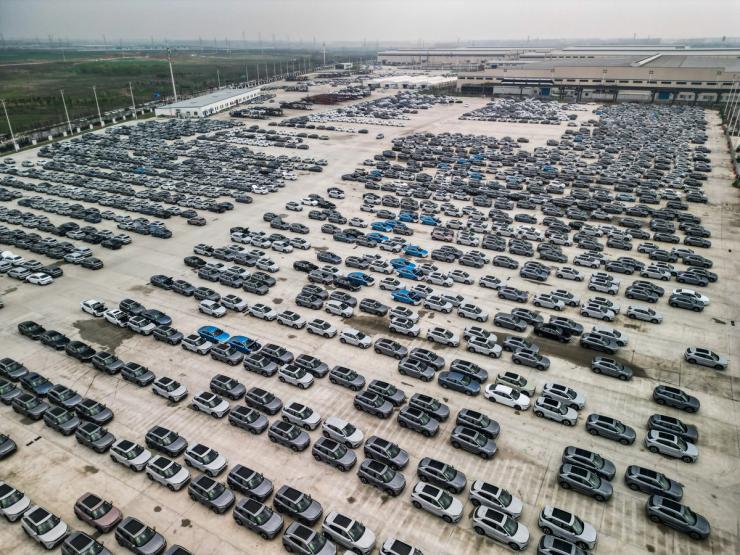The News
In 2016, Taiyuan became the first Chinese city to begin converting its entire taxi fleet to electric vehicles. Now, it is leading the way again by scrapping them and, in the process, planting the seeds for what may be the world’s next big green industry.
Details about the scrappage program for the more than 8,000 cabs are scarce, but as with a number of other clean-tech sectors — solar panels, electric vehicles, and wind turbines, to name a few — a combination of early and aggressive state direction, mammoth scale, and pointed regulation leave China poised to dominate the nascent world of battery recycling.
Know More
National rules in China require that all taxis — electric or not — be scrapped after eight years or 600,000 kilometers (about 370,000 miles) on the road, to ensure safety and spur technological innovation. (Electric buses, by comparison, get 13 years and 400,000 kilometers.) Authorities in Taiyuan have chosen one company to recycle the cars’ bodies, and another to handle the used batteries, Beijing News reported.
The program in Taiyuan, capital of China’s coal hub province of Shanxi, is expected to be the first of a huge number nationwide in the coming years: The country had put an estimated 132,000 electric taxis on the road by the end of 2020, all of which will have to be replaced in the coming four years. The amount of spent EV batteries in China is projected to soar from 294,000 tons in 2021 to 1.2 million tons in 2025, according to the China Automotive Technology and Research Center. By 2030, the country is expected to have three million tons of them each year, which translates into a 150-billion-yuan ($21 billion) market, the center said.
China’s taxi recycling effort paves the way for an even bigger battery-recycle market going forward as the number of privately owned EVs surges: China is the world’s fastest-growing EV market, with the overall number of “new energy vehicles” — a category that includes hybrids and fuel-cell cars — exploding from 4.9 million in 2020 to 20.4 million last year. (There are no hard scrappage rules for private cars, but EV batteries are typically designed to last five to eight years, and their per-charge range drops as time goes by.)
Xiaoying’s view
The economic and climate consequences of China’s scrappage policy are enormous, and its efforts should be closely watched worldwide: This is a problem many countries racing to electrify their vehicles will inevitably have to face themselves.
For one, because batteries make up nearly half the price of an EV, many vehicle owners may decide to buy an entirely new car when the battery needs replacing, Shen Xinyi, a researcher at the Centre for Research on Energy and Clean Air, a Helsinki-based think tank, told me. And as each vehicle typically contains around 900 kilograms of steel, recycling cars’ bodies can up the supply of scrap steel, which can be repurposed to produce steel with lower carbon emissions, Shen added.
But the real trash-to-treasure tale lies in spent EV batteries. And all signs point to a lucrative market on the rise, with industry leaders already emerging.
Most simply, old batteries can be repurposed to power other products. Their real value, however, lies in their materials: lithium, cobalt, and nickel, which can be removed and reused. On average, the battery minerals in each EV are worth as much as $1,700, BMW’s sustainability chief recently told Reuters.
This “black mass” — crushed and shredded battery cells — can also help countries carve out a new source of strategic minerals. China is projected to be the first country in the world to be able to meet all of its demand for key battery materials solely by recycling them from used ones, a recent study forecast.
And the companies that want to dominate the sector are already emerging. One of them is GEM, or Green Eco Manufacture, which claims to process around 10% of all spent EV batteries in China. Automakers including BYD and Geely have also invested in battery-recycling subsidiaries.
GEM was founded in 2001 by Xu Kaihua, a professor turned entrepreneur who started what is now a recycling empire in Shenzhen by specializing in extracting nickel and cobalt from digital waste, according to the Changjiang Times. He ventured into EV battery recycling in 2012 after acquiring a cobalt-processing company and quickly mapped out a full-circle business model covering battery recycling, mineral extraction, and battery production. GEM reported record revenues of 30.5 billion yuan ($4.2 billion) for 2023, cementing Xu’s position as the “king of rubbish,” a nickname he takes pride in.
Room for Disagreement
Plenty of obstacles remain in building out a battery-recycling industry.
A lack of regulation, for example, has created headaches. Until last year, less than 25% of retired EV batteries in China were recycled through regulated recyclers. This means the majority are handled by unregulated workshops or individuals, who are willing to pay more for them and often dismantle them dangerously. The trend is worrying as the recycling of EV batteries can cause fires or contaminate the environment if handled improperly.
“Regulation is urgently needed to fill the gap,” said Alicia García Herrero, a senior fellow at Bruegel, a Brussels-based think tank.
Consumers also need to be educated on what to do and what not to do, according to Cory Combs, associate director of Trivium China, a Beijing-based research group. Battery recycling should be a “big industrial responsibility,” Combs said. “One thing that might help is battery-swapping infrastructure,” he added.
Some experts have also questioned the necessity of scrapping e-taxis after just eight years. In Taiyuan’s case, “most cars, in fact, were in really good condition and could instead have been sold on the open market with a decent value,” said Hans Eric Melin, managing director of Circular Energy Storage, a London-based consultancy.
The View From the US
The US battery-recycling industry is being bolstered by the Inflation Reduction Act, which deems EV battery materials recycled in the US as eligible for subsidies. The IRA also mandates that by 2027, 80% of the value of critical minerals in EV batteries is extracted or processed in the US, or in a country with which it has a free-trade agreement, such as South Korea. The International Council on Clean Transportation said it expects the US to have a battery recycling capacity of at least 652,293 tons per year by 2030 — enough to handle about 1.3 million end-of-life EV batteries annually.
Notable
- Redwood Materials, a company founded by Tesla’s co-founder JB Straubel, is now the largest battery recycler in North America. Straubel spoke with Bloomberg about his hopes and challenges for his recycling venture.


